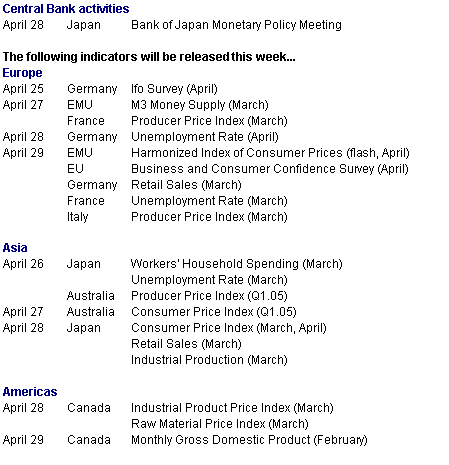Monday, April 25, 2005

Global Markets
Equity markets have been volatile, first plunging on worries about the strength of the U.S. economy - and then bouncing back on earnings and merger news. On Monday, European and Asian markets fell heavily in early trade prior to the onset of U.S. trading in nervous anticipation of a follow-up to Friday's brutal sell-off. But the worst case scenario did not materialize as bulls and bears kept the market swinging between positive and negative territory. And conditions remained highly volatile and sentiment weak during the entire week. During the week, the Dow skirted the 10,000 level, although it managed to stay above it and climb from there, with a dramatic rally on Thursday.
Views on equities remain divided as investors digested the recent spate of economic data that showed a slowing U.S. economy (poor retail sales figures) and positive data that belied that interpretation (drop in unemployment claims and an unexpected jump in the Philadelphia Fed index). World stock markets enjoyed a rebound on Tuesday as investors' frazzled nerves were soothed by some positive corporate results (from Texas Instruments) and muted U.S. inflation data and stabilized as the week progressed. On the week the all ordinaries and the Hang Seng managed to recover from their precipitous drops earlier in the week and finish higher. Indexes in Europe and Britain were not that lucky. Indexes in the Americas were up on the week, thanks primarily to Thursday's rallies.
Global Stock Market Recap

Europe and Britain
It was an ugly week, with losses taking the FTSE, CAC and DAX ever lower. Although they steadied somewhat after Monday's rout, they were unable to recoup the week's losses. Disappointing economic data at home compounded worries from abroad - namely that the U.S. growth was weakening. In Europe, a concern about the possible rejection of the European Union's draft constitution by France at the end of May is weighing on investors. And conjectures of what would happen to the EU if it were rejected have surfaced. The constitution must be approved unanimously by all 25 members to be enacted.

The gyrations of U.S. stocks also continued to impact trading elsewhere. Thursday's strong manufacturing data and healthy earnings reports helped offset concerns about weakness in the economy, rising interest rates and the threat of higher inflation. Fed chairman Alan Greenspan's Senate budget committee testimony also helped as investors honed in on his positive statement about growth and ignored his more negative assessment that U.S. budget deficits were growing at an "unsustainable" rate.
Asia/Pacific
Asian/Pacific stocks followed U.S. stocks as they usually do, reacting to April 15's slide after the weekend and responding to Thursday's exuberant gain on the day after. (U.S. trading takes place over night in Asian time.) While stocks in Australia and Hong Kong managed to recover earlier losses and gain on the week, stocks in Japan, South Korea and Singapore did not. Friday's gains were triggered by U.S. indexes that had their biggest gains in 18 months. The gains in turn boosted optimism that the U.S. would continue to support Asian exporters' earnings.

Japanese stocks were down sharply, but managed to stabilize, aided by companies that do business in China, such as Shiseido Co., after Japanese Prime Minister Junichiro Koizumi apologized for the suffering his country inflicted on neighboring Asian nations before and during World War II. China Central Television reported a government official called on people to end a boycott of Japanese goods. Shipping stocks have been particularly badly hit by the deterioration in Sino-Japanese relations of late.
Sentiment was also depressed by news that foreign investors had sold net �126 billion Japanese stocks in the week to April 16th - a reversal of the previous week's net buying. Investors that are bullish on Japan are afraid of a flight of capital, which often happens at times when economic prospects appear to grow dimmer.
Currencies
The yen rose the most in two months against the dollar and surged versus the euro after Japanese Prime Minister Junichiro Koizumi's apology for wartime suffering in neighboring Asian nations eased concern Japan would lose business in China. The yen also rose against the Korean won, Swiss franc and British pound after Koizumi said he will meet with Chinese President Hu Jintao over the weekend. Koizumi and Hu are trying to reverse deteriorating relations between Asia's two biggest economies. China now is Japan's largest export market after surpassing the U.S. last year. The yen was also helped by the increasing pressures on China to un-peg its currency from the U.S. dollar. The euro also gained on the dollar for the week.

Indicator scoreboard
EMU - March harmonized index of consumer prices was up 0.7 percent and 2.2 percent when compared with last year. Energy prices jumped 2.4 percent while clothing costs soared 5.4 percent. Core HICP which excludes energy and food, alcohol & tobacco also was up 0.7 percent but up 1.6 percent on the year.

February seasonally adjusted industrial production dropped 0.5 percent but was up 0.6 percent when compared with last year. Output was down for all major product categories with the exception of energy. Only Italy, Greece and Portugal reported monthly output increases.

February seasonally adjusted merchandise trade surplus edged up to �5.1 billion from �5 billion in the previous month. Exports were down 0.4 percent while imports dropped 0.6 percent. The February unadjusted merchandise trade balance improved to a surplus of �3 billion after recording a deficit of �1.7 billion in the previous month.

February seasonally adjusted industrial orders sank 2.6 percent but were up 2.9 percent when compared with last year. All sectors dropped with the exception of machinery and equipment. Orders were down in five of the six countries reporting.
Germany - April ZEW expectations among German financial experts sank to 20.1 from 36.3 in March. The Mannheim-based Center for European Economic Research (ZEW) said that the decline in February manufacturing orders as well as weakening global economic growth were likely the chief reasons for the decline. Current economic conditions index deteriorated to minus 73 from minus 66. The ZEW surveyed 311 German financial experts for their opinions on current economic conditions and the economic outlook for major industrial economies between March 29th and April 18th.

March producer price index jumped 0.6 percent and was up 4.2 percent when compared with last year. Energy prices increased 2 percent led by crude prices which soared 6.6 percent on the month. Excluding energy prices, the PPI was up 0.1 percent and 2.6 percent on the year.

France - March consumer spending for manufactured goods dropped 0.7 percent but was up 4 percent when compared with last year. Auto sales were up 1.3 percent but household durables spending dropped 1 percent.

Italy - February seasonally adjusted industrial orders were up 0.7 percent and 3.2 percent when compared with last year. Domestic orders edged down 0.1 percent but were up 1.3 percent on the year while foreign orders were up 2.6 percent and 7.7 percent on the year. Domestic orders account for about 70 percent while foreign orders make up the rest. No product breakdown is available for the monthly data. On the year, six of ten product sectors recorded gains.
February seasonally adjusted retail sales edged up 0.1 percent but were down 0.8 percent when compared with last year. On an unadjusted basis, retail sales were up 0.6 percent on the year thanks to higher sales for both food and non-food items. ISTAT's retail sales data is not closely watched because it shows little correlation with consumer spending included in GDP statistics.

Britain - March consumer price index was up 0.4 percent and 1.9 percent when compared with last year. This was the highest on year increase since May 1998 and just below the Bank of England's inflation target of 2 percent. The index was pushed up primarily by transport prices which were up 0.7 percent and 4 percent on the year. Food and beverage prices were up 0.8 percent and 1.7 percent on the year. Excluding food, alcoholic beverages & tobacco and energy the CPI was up 0.4 percent and 1.4 percent on the year. The retail price index excluding mortgage interest payments jumped 0.5 percent and was up 2.4 percent on the year. The Bank of England inflation target is 2 percent.

March retail sales were down 0.1 percent but up 2.7 percent when compared with last year. The decline was attributed to a sharp drop in mail order business. Non-store retailing and repair sector sank 3.9 percent. Food sales were unchanged while non-food sales inched up 0.2 percent on the month.

First quarter gross domestic product was up 0.6 percent and 2.8 percent when compared with the same quarter last year. Services were up 0.8 percent and 3.6 percent on the year but production industries were down 0.1 percent and down 0.2 percent on the year primarily due to drops in utilities and mining.

Asia
Japan - March unadjusted merchandise trade surplus was �1.12 trillion. Exports were up 6.2 percent while imports were up 7.8 percent when compared with a year ago. The trade surplus with the U.S. was up 17.5 percent on the year while the surplus with Asia was down 2.4 percent.

February seasonally adjusted tertiary index dropped 1 percent but was up 1.7 percent when compared with last year. The retail component sank 3.8 percent while the wholesale declined 2.3 percent. Retail and wholesale trade combined account for 25 percent of the index. The tertiary index reflects activity in 11 service industries, among which are utilities; transport; telecommunications; wholesale and retail; finance and insurance; real estate; restaurants and hotels; medical, health care and welfare.
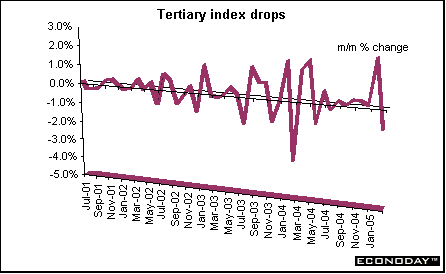
February all-industry index dropped 1.1 percent and rose 1.1 percent from a year earlier. The all industry index takes a reading of activity in the 11 industries that comprise the tertiary index combined with activity in the construction, agricultural and fisheries industries, the public sector and industrial output. This index is considered a close approximation for gross domestic product growth as measured by industrial and service sector output.
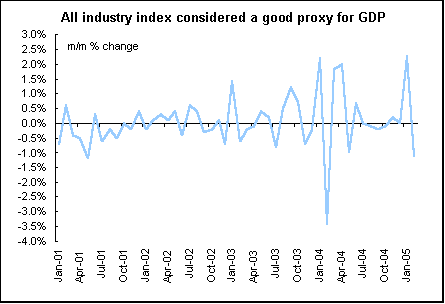
Americas
Canada - February retail sales increased 1.7 percent after jumping 2.1 percent in January. Retail sales were up 7.7 percent on the year. Excluding autos, sales were up 1.3 percent and 8 percent on the year. All sectors were up with the exception of general merchandise stores. The auto sector was up 2.4 percent, boosted by new car sales.
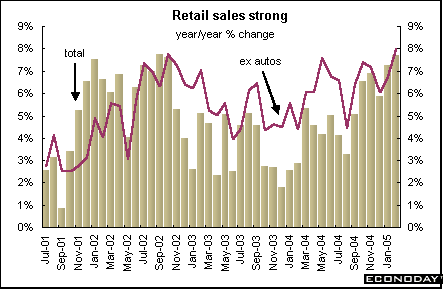
March consumer price index was up 0.6 percent and 2.3 percent when compared with last year. The increase was due to higher prices for gasoline, women's clothing and travel tours. Core CPI, which excludes food and energy was up 0.3 percent and 1.5 percent on the year. The Bank of Canada core CPI, which excludes eight volatile items, was up 0.4 percent and 1.9 percent on the year. Seasonally adjusted CPI was up 0.3 percent and 2.3 percent on the year.
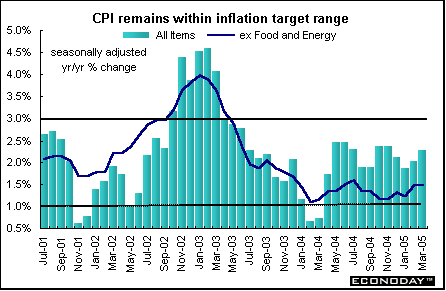
Bottom line
At its meeting next week, the Bank of Japan is expected to abandon its forecast of a return to inflation this fiscal year, delaying an exit from zero interest rates until the year to March 2007 at the earliest according to a former bank governor. The Bank's half yearly forecast, due out on Thursday, would reverse its October prediction that deflation would end this year by registering a consumer price rise of 0.1 per cent. Rather, it is expected to predict yet more deflation. Consumer prices have been falling for more than seven years.
It should be noted that the Bank of England's Monetary Policy Committee are in pre-election purdah (or seclusion) and will not comment on any monetary policy issues prior to the general election scheduled on May 5th. The MPC meeting has been postponed from May 4th and 5th to May 6th, the day after the election and 9th, when the announcement will be made.
Looking Ahead: April 25 through April 29, 2005
